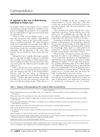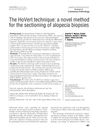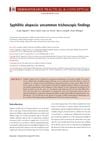 September 2023 in “Clinical, cosmetic and investigational dermatology”
September 2023 in “Clinical, cosmetic and investigational dermatology” A new surgical method using special sutures significantly reduced wound size and prevented disease return in patients with a scarring scalp condition.
 48 citations,
October 2011 in “Sports Medicine”
48 citations,
October 2011 in “Sports Medicine” Ice-skating athletes often have skin problems due to cold, infections, and inflammation, needing careful treatment and prevention.
 22 citations,
August 2009 in “Evidence-based Complementary and Alternative Medicine”
22 citations,
August 2009 in “Evidence-based Complementary and Alternative Medicine” The composition with carnitine, thioctic acid, and saw palmetto extract may effectively reduce inflammation in hair follicle cells.
 7 citations,
March 2016 in “Journal of Cosmetic and Laser Therapy”
7 citations,
March 2016 in “Journal of Cosmetic and Laser Therapy” Home-use lasers and IPL devices are unlikely to directly cause paradoxical hair growth; it may be linked to inflammation or hormonal issues.
 29 citations,
March 2001 in “Clinics in Dermatology”
29 citations,
March 2001 in “Clinics in Dermatology” Steven Kossard classified lymphocyte-related hair loss into four patterns, each linked to different types of baldness.
 March 2024 in “International Journal of Cosmetic Science”
March 2024 in “International Journal of Cosmetic Science” Dandruff is linked to increased T cells and weakened immune protection in hair follicles.
 July 2018 in “Elsevier eBooks”
July 2018 in “Elsevier eBooks” Lichen Planopilaris is a hair loss condition best treated early with various medications, including hydroxychloroquine, to prevent permanent baldness.
 47 citations,
June 2014 in “Journal of Dermatological Treatment”
47 citations,
June 2014 in “Journal of Dermatological Treatment” Most treatments for lichen planopilaris were found to be generally unsatisfactory.
 14 citations,
January 2015 in “Current problems in dermatology”
14 citations,
January 2015 in “Current problems in dermatology” Female pattern hair loss treatments vary in effectiveness and may have side effects.
 13 citations,
January 2016 in “Journal of cosmetology & trichology”
13 citations,
January 2016 in “Journal of cosmetology & trichology” Alternative treatments show promise for hair growth beyond traditional methods.
 9 citations,
September 2016 in “Dermatologic Surgery”
9 citations,
September 2016 in “Dermatologic Surgery” New LPP subtype affects vellus hairs, mimics AGA, and needs biopsy for diagnosis.
 5 citations,
February 2017 in “Australasian Journal of Dermatology”
5 citations,
February 2017 in “Australasian Journal of Dermatology” Scarring hair loss found in female pattern; biopsy needed for diagnosis.
 5 citations,
July 2013 in “Our Dermatology Online”
5 citations,
July 2013 in “Our Dermatology Online” Lichen planopilaris is the most common type of scarring hair loss observed, with a variety of symptoms and tissue changes.
 4 citations,
May 2020 in “Journal of The American Academy of Dermatology”
4 citations,
May 2020 in “Journal of The American Academy of Dermatology” Cicatricial pattern hair loss is likely advanced common baldness, not a type of lichen planopilaris.
 1 citations,
February 2023 in “Journal of the American Board of Family Medicine”
1 citations,
February 2023 in “Journal of the American Board of Family Medicine” Primary care should recognize and treat hair loss in hijab-wearing individuals with cultural sensitivity.
 October 2021 in “The Egyptian Journal of Hospital Medicine”
October 2021 in “The Egyptian Journal of Hospital Medicine” Alopecia areata causes patchy hair loss and involves immune system disruptions.
 April 2012 in “Informa Healthcare eBooks”
April 2012 in “Informa Healthcare eBooks” Lichen planopilaris is a rare, chronic condition causing hair loss, mainly in middle-aged women, and early treatment is important to prevent permanent baldness.
 159 citations,
December 2007 in “American Journal of Pathology”
159 citations,
December 2007 in “American Journal of Pathology” Stress-related substance P may lead to hair loss and negatively affect hair growth.
 150 citations,
October 2010 in “The American Journal of Pathology”
150 citations,
October 2010 in “The American Journal of Pathology” The document concludes that more research is needed to better understand and treat primary cicatricial alopecias, and suggests a possible reclassification based on molecular pathways.
 54 citations,
January 1983 in “Archives of Dermatology”
54 citations,
January 1983 in “Archives of Dermatology” KFSD is a rare condition causing scarring hair loss, with no effective treatment known at the time of the report.
 48 citations,
January 2002 in “Dermatology”
48 citations,
January 2002 in “Dermatology” Hair pain is more common in women with hair loss, but it's not linked to the cause or severity of hair loss.
 46 citations,
January 1996 in “Journal of The American Academy of Dermatology”
46 citations,
January 1996 in “Journal of The American Academy of Dermatology” People with late-stage HIV-1 often experience a specific type of hair loss linked to multiple factors, including nutritional issues and immune responses.
 44 citations,
January 2011 in “Journal of Cutaneous Pathology”
44 citations,
January 2011 in “Journal of Cutaneous Pathology” The HoVert technique is a simple, cost-effective new method that improves alopecia diagnosis by allowing detailed analysis from a single biopsy.
 38 citations,
January 2009 in “Journal of Cutaneous Medicine and Surgery”
38 citations,
January 2009 in “Journal of Cutaneous Medicine and Surgery” A woman developed hair loss after starting a treatment with adalimumab, suggesting this medication might cause hair loss.
 32 citations,
July 2017 in “Dermatology practical & conceptual”
32 citations,
July 2017 in “Dermatology practical & conceptual” New hair and skin changes were found in a rare case of syphilis-related hair loss.
 12 citations,
June 2012 in “Dermatologic Surgery”
12 citations,
June 2012 in “Dermatologic Surgery” Hair transplantation effectively treated a woman's patchy hair loss when other treatments failed.
 11 citations,
May 2011 in “Journal of Cutaneous Medicine and Surgery”
11 citations,
May 2011 in “Journal of Cutaneous Medicine and Surgery” Break dancing on the head may cause a type of scarring hair loss that needs early treatment to prevent permanent damage.
 9 citations,
January 2010 in “International Journal of Trichology”
9 citations,
January 2010 in “International Journal of Trichology” The study found that the cause of alopecia areata can be identified through tissue analysis, and vertical sections are enough for diagnosis.
 8 citations,
March 2020 in “Dermatologic Therapy”
8 citations,
March 2020 in “Dermatologic Therapy” The new hair loss treatment kit was safe and improved hair growth without any adverse effects.
 7 citations,
October 2000 in “Allergo Journal”
7 citations,
October 2000 in “Allergo Journal” Stress may affect hair growth by influencing hair follicle development and could contribute to hair loss.





























